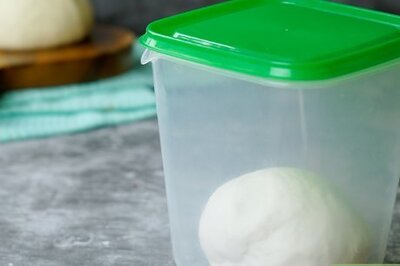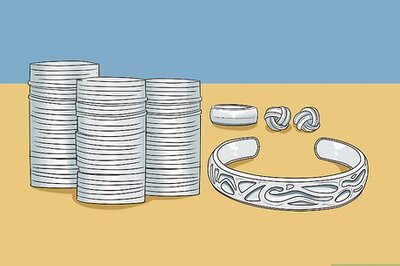
views
The dryer may not be getting enough power.
Check that the outlet is working and wasn't tripped. Your GE dryer requires a 240V outlet to heat the drum. If the circuit breaker was tripped earlier, your dryer may not be getting the 240V it needs and spin without heat. If you're unsure, it's best to call an electrician to test the voltage and make sure your outlet is powerful enough for your dryer. You also want to reset any tripped circuits.
There could be a gas problem (gas dryers only).
Check the gas line is functioning. Make sure the gas line is properly connected and that the gas is turned on. If the gas switch is horizontal, the gas is off—rotate it to the vertical position to turn it on. For good measure, check other gas elements in your home, such as your heating system and stove, or check your meter to see if you can use gas. If your home gas supply isn't working, the problem isn't your GE dryer, but your main gas line.
A cycle without heat might be selected.
Settings like "Fluff" or "Cooldown" could be why your dryer is spinning without heat. Cycles like these spin without heat and can make you think something is wrong with your dryer. Use a setting like "Normal" to ensure heat is used during the cycle.
The front of the dryer is blocked.
Clothes, baskets, or other objects can block the airflow your dryer needs. This will result in the dryer not heating if it senses a lack of airflow. Remove the obstructions to get your GE dryer working properly.
The dryer vent is clogged.
Most modern dryers stop heating if the airflow is restricted to prevent fires. This safety feature might be awesome, but finding a load of wet clothes after drying them for an hour is a hassle that no one wants to deal with. To see if your vent is clogged, turn on the dryer to what should be a heated cycle. Go outside your house and locate the dryer vent (it's just a hole in the wall) and feel the exiting air from your dryer. A weak, not-hot airflow indicates that the vent may be clogged. Follow our vent-cleaning guide to resolve the problem or contact a professional.
The lint filter could be clogged.
A clogged lint filter (lint trap) can prevent your dryer from heating. If the dryer is spinning but not heating, whether there's a little bit of heat or no heat at all, cleaning lint from the filter will often fix the problem. To clean the lint filter, open the dryer door, lift the filter from the front of the dryer drum, and use your hands to remove the lint and fuzz. You can also use a pipe cleaner or a vacuum to clean excess lint out of the vent from which you pulled out the filter. If the filter screen is still dirty, clean it with water by holding the filter under your sink faucet and rubbing the dirt away. Let the filter dry completely before placing it back into your dryer. Remember to clean the lint tray before or after every load.
The power cord is frayed, bent, or burnt.
A damaged power cord won't send enough power to the dryer to heat. To inspect the cord and avoid electrical shock, follow these steps: Turn the power off to your dryer. Unplug your dryer from the wall and pull it out. Remove the screws holding the power cord in place so you can access the terminal block connections. Look over the power cord for burnt pieces, frayed edges, and loose wires. If you find any of these damages, you'll need to purchase a replacement power cord.
The heating element could have burned out.
If the heating element fails, the dryer will stop heating. The heating element in your dryer may stop working after you've had the dryer for a long time, especially if you haven't done regular maintenance to keep the ventilation clear. If you feel comfortable disassembling your dryer, you can use a multimeter to check the heating element for continuity. If the heating element has burned out, you can purchase a replacement heating element from an authorized reseller. Unplug the dryer, and disconnect the gas if you have a gas dryer. Check your dryer manual for the location of the heating element. It's usually just below or beside the drum. Remove the heating element assembly, a silver box surrounding the heating element itself. Don't remove the heating element from its metal assembly, as you can check for continuity without opening the box. With your multimeter in Continuity mode, place the probes onto each of the heating element's terminals. If you hear a beep, the heating element has continuity. If not, it needs to be replaced. To check for shorts, put one probe on one of the terminals, and the other on the metal housing. Then, repeat for the second terminal. If there is continuity between either of the terminals and the metal housing, the heating element has shorted and needs to be replaced.
The thermal fuse or thermostat might've burned out.
The dryer won't heat if the thermal fuse or thermostat is burnt out. Most newer dryers won't even spin if the thermal fuse is the problem, but for older non-digital models, a dead thermal fuse could cause your dryer to spin without heat. If you're comfortable disassembling your dryer and using a multimeter, you can usually diagnose the problem by performing a continuity test and replace the fuse yourself. First, check your dryer's manual to learn the location of the thermal cutoff fuse and high-limit thermostat. Before opening your dryer, unplug it from the wall. If it's a gas dryer, disconnect the gas as well. Remove the thermal fuse and thermostat from your dryer. Set your multimeter to Continuity mode. Place the probes on both of the fuse's terminals at the same time. If you hear a beep, the thermal fuse works, and you can check the thermostat. If there is no beep, you should replace the fuse and the thermostat. Perform the same test on the thermostat. If the thermostat is dead, replace both the thermostat and the thermal fuse.




















Comments
0 comment